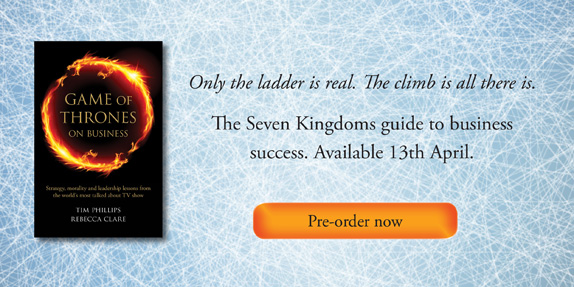What Game of Thrones tells us about corporate inbreeding
25 June 2014 by Rebecca in Business and finance, Game of Thrones on Business
Incest – it’s not about the sex, says Tim Phillips
‘Alongside kinslaying and the violation of guest right, incest is proscribed by every major religion in Westeros,’ the Game of Thrones Wiki tells us, ‘Children born of incest are deemed abominations.’
Didn’t stop them doing it though. Clearly there’s ‘proscribed by every major religion’ and ‘who are you to tell us what to do?’ For those of you not familiar with the Game of Thrones backstory, King Aerys II Targaryen (the Mad King) married his own sister, Queen Rhaella Targaryen. King Aerys made good on his nickname by going insane thanks to inbreeding, and his son Viserys wasn’t all there either.
 This, you might conclude, would be an argument against imitating his actions. But Queen Cersei and her brother Jaime Lannister have, even by the beginning of Game of Thrones series 1, been going at it for years. This has the unfortunate consequence that they produce barmy King Joffrey, a sort of psychotic Milky Bar Kid.
This, you might conclude, would be an argument against imitating his actions. But Queen Cersei and her brother Jaime Lannister have, even by the beginning of Game of Thrones series 1, been going at it for years. This has the unfortunate consequence that they produce barmy King Joffrey, a sort of psychotic Milky Bar Kid.
This is a pretty accurate depiction of the sexual behaviour of European royalty through several centuries. For example, John V of Armagnac in the 15th century took up with a young girl called Isabelle who was considered one of the greatest beauties in France. This was controversial because there had been talk of marrying her to Henry VI of England before he stepped in. It was even more controversial because she was also his sister. After they had two children John V promised to keep his codpiece buttoned while his sister was around, so the kerfuffle didn’t exactly die down when they got married (claiming the Pope had told them it was OK), and had a third child.
The literal aristocrats of incestual ick were undoubtedly the Habsburgs, who bred so enthusiastically with their cousins that, by the 17th century King Charles II was ‘physically disabled, mentally retarded and disfigured’. Academic studies calculate that Hapsburg marriages had up to 25% of genes in common.
You don’t have to be a disciple of Sigmund Freud to be aware that incest fantasies are common; every internet porno site has an incest category. Well, that’s what PEOPLE TELL ME. But the Habsburgs weren’t being kinky. Royal incest is about power. It kept the fortune in the family – if your extended family was also in charge of the country next-door, then a political alliance meant a family wedding, whether you were into that sort of thing or not.
So, if we concentrate on the sex, we’re missing the point. This is about power, and keeping power close. Power influences the way the cake is cut: the more you concentrate power, the more of the cake you keep. What psychologists call ‘other-regarding behaviour’ is more common among those genetically closer to us, or those with a similar world view.
It often isn’t a plan, but an outcome of a natural (though misguided) thought process, in which we trust and value people who look and talk like us. People in power share power with their ‘family’. Few discriminate consciously, but only a small group of the population has the social capital (confidence, education, powerful friends and common experiences) to be part of the ‘in group’. Are these always the best people to wield power? Your opinion may be influenced by whether you are in that group or not.
We assume that shareholder capitalism places controls on CEOs and their executive officers, just as royal alliances between families were meant to moderate the behaviour of each ruler: but when the powerful actors are ‘family’, the opposite can often be the case.
This survey shows how corporate dynasties intermarry by sitting on each other’s boards. One result: a small group effectively decides one another’s compensation, and we all know how executive pay has ballooned in the last 30 years at a far greater rate than profits have increased. That’s not criminal. But scandals at Enron, WorldCom and many others – in which the performance of a supine board has been shown to be a contributing factor – shows what can happen when intermarriage gives too much power, with too little oversight, to the King Joffreys of the corporate world.
Tim Phillips is author of Niccolo Machiavelli’s The Prince, Bertrand Russell’s The Conquest of Happiness, and Charles Mackay’s Extraordinary Popular Delusions and the Madness of Crowds.
You might also like: What Machiavelli knew and Robb Stark found out; Why Game of Thrones is better than PowerPoint.

